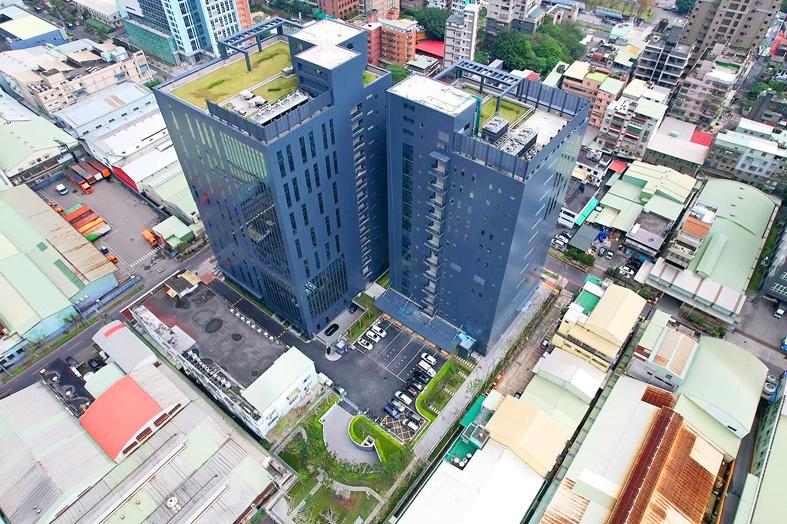Prices for presale and new homes in northern Taiwan in the first quarter climbed 12.1 percent year-on-year, accelerating from an 8.7 percent increase in the fourth quarter following spiking construction costs and imbalanced supply and demand, the Chinese-language Housing Monthly (住展雜誌) said yesterday.
The spike in prices came even though developers and builders had launched fewer projects, amid unfavorable policy measures at home and geopolitical tensions abroad, Housing Monthly research manager Ho Shih-chang (何世昌) said.
“The data suggest a continued boom, although greater uncertainty looms ahead,” Ho said, referring to further credit controls in areas with rapidly rising housing prices.

Photo courtesy of the New Taipei City Urban Regeneration Office
Prices for presale and new homes have received support from persistent labor shortages and steep increases in the price of building materials, Ho said, adding that increased inflation is expected across the supply chain following Russia’s invasion of Ukraine in February.
Prices for presale and new homes in Taipei averaged NT$973,000 (US$33,312) per ping (3.2m2), a 2.3 percent rise from three months earlier and a 7.9 percent increase from a year earlier, Housing Monthly’s report found.
Sale prices are soon to surpass NT$1 million per ping throughout the city, as buyers become more accustomed to such prices in districts outside central Taipei, such as Neihu (內湖), Nangang (南港) and Beitou (北投), Ho said.
Previously, such asking prices were only seen for homes in Daan (大安), Xinyi (信義), Zhongcheng (中正) and Songshan (松山) districts.
Prices for new homes in New Taipei City climbed 2.3 percent to NT$437,000 per ping from the fourth quarter, while prices in Taoyuan rose 4.4 percent to NT$287,000 per ping, Housing Monthly said.
Buyers are willing to give up trying to afford Taipei and settle in New Taipei City or Taoyuan due to the relative affordability of the housing and the improving infrastructure there, it added.
Housing prices in Hsinchu climbed 11 percent quarter-on-quarter and 27.4 percent year-on-year to NT$302,000 per ping, as it overtook Taoyuan to become Taiwan’s third most expensive place to live, it said.
Residents of Hsinchu who work for major tech firms have relatively high incomes, especially as the COVID-19 pandemic has increased demand for electronics used in remote working and distance learning.

Taiwanese suppliers to Taiwan Semiconductor Manufacturing Co. (TSMC, 台積電) are expected to follow the contract chipmaker’s step to invest in the US, but their relocation may be seven to eight years away, Minister of Economic Affairs J.W. Kuo (郭智輝) said yesterday. When asked by opposition Chinese Nationalist Party (KMT) Legislator Niu Hsu-ting (牛煦庭) in the legislature about growing concerns that TSMC’s huge investments in the US will prompt its suppliers to follow suit, Kuo said based on the chipmaker’s current limited production volume, it is unlikely to lead its supply chain to go there for now. “Unless TSMC completes its planned six

Intel Corp has named Tasha Chuang (莊蓓瑜) to lead Intel Taiwan in a bid to reinforce relations between the company and its Taiwanese partners. The appointment of Chuang as general manager for Intel Taiwan takes effect on Thursday, the firm said in a statement yesterday. Chuang is to lead her team in Taiwan to pursue product development and sales growth in an effort to reinforce the company’s ties with its partners and clients, Intel said. Chuang was previously in charge of managing Intel’s ties with leading Taiwanese PC brand Asustek Computer Inc (華碩), which included helping Asustek strengthen its global businesses, the company

Power supply and electronic components maker Delta Electronics Inc (台達電) yesterday said second-quarter revenue is expected to surpass the first quarter, which rose 30 percent year-on-year to NT$118.92 billion (US$3.71 billion). Revenue this quarter is likely to grow, as US clients have front-loaded orders ahead of US President Donald Trump’s planned tariffs on Taiwanese goods, Delta chairman Ping Cheng (鄭平) said at an earnings conference in Taipei, referring to the 90-day pause in tariff implementation Trump announced on April 9. While situations in the third and fourth quarters remain unclear, “We will not halt our long-term deployments and do not plan to

The New Taiwan dollar and Taiwanese stocks surged on signs that trade tensions between the world’s top two economies might start easing and as US tech earnings boosted the outlook of the nation’s semiconductor exports. The NT dollar strengthened as much as 3.8 percent versus the US dollar to 30.815, the biggest intraday gain since January 2011, closing at NT$31.064. The benchmark TAIEX jumped 2.73 percent to outperform the region’s equity gauges. Outlook for global trade improved after China said it is assessing possible trade talks with the US, providing a boost for the nation’s currency and shares. As the NT dollar